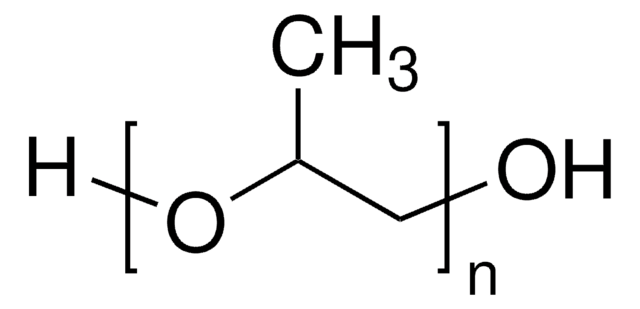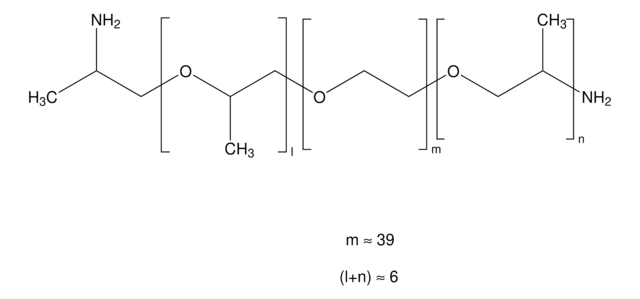435503
Poly(propylene glycol)-block-poly(ethylene glycol)-block-poly(propylene glycol)
average Mn ~3,300
Synonym(s):
Pluronic® 31R1, PPG-PEG-PPG
Sign Into View Organizational & Contract Pricing
All Photos(1)
About This Item
CAS Number:
MDL number:
UNSPSC Code:
12352112
PubChem Substance ID:
NACRES:
NA.23
Recommended Products
form
viscous liquid
Quality Level
mol wt
average Mn ~3,300
composition
PEG, 10 wt. %
refractive index
n20/D 1.454
surface tension
34 dyn/cm, 25 °C, 0.1 wt. % in H2O
viscosity
660 cP(25 °C, Brookfield)(lit.)
transition temp
softening point −25 °C
cloud point 25 °C (1 wt. % aqueous solution)
density
1.018 g/mL at 25 °C
HLB
2.0 - 7.0
SMILES string
O2C(C2)C.O1CC1
InChI
1S/C3H6O.C2H4O/c1-3-2-4-3;1-2-3-1/h3H,2H2,1H3;1-2H2
InChI key
RVGRUAULSDPKGF-UHFFFAOYSA-N
General description
Surface activity of the polymer is dependent on the EO/PO ratio. PPG-PEG-PPG exhibits lower foaming, greater defoaming and reduced gelling tendencies relative to Pluronic® surfactants. Terminal secondary hydroxyl groups of PPG-PEG-PPG have lower reactivity and acidity than the primary hydroxyl groups in Pluronic surfactants.
Application
Hard and soft surface cleaners, defoamers in coatings and water treatment. Lubricant in metal working, anti-foaming aid and extender for linear and cross-linked polyesters and polyurethanes.
PPG-PEG-PPG Pluronic® 31R1 can be used as surface cleaners (soft and hard), defoamers in coatings, in water treatment, lubricant in metal working, anti-foaming aid and extender for linear and cross-linked polyesters and polyurethanes.
Features and Benefits
Surface activity is dependent on the EO/PO ratio. Lower foaming, greater defoaming and reduced gelling tendencies relative to Pluronic® surfactants. Terminal secondary hydroxyl groups have lower reactivity and acidity than the primary hydroxyl groups in Pluronic® surfactants.
Legal Information
Pluronic is a registered trademark of BASF
Storage Class Code
10 - Combustible liquids
WGK
WGK 3
Flash Point(F)
Not applicable
Flash Point(C)
Not applicable
Choose from one of the most recent versions:
Already Own This Product?
Find documentation for the products that you have recently purchased in the Document Library.
Customers Also Viewed
A N Sklifas et al.
Biofizika, 57(2), 317-324 (2012-05-19)
The adsorption abilities of the perfluorocarbon emulsion stabilized by Proxanol 268 were investigated in vitro and in vivo. In vitro, the saturation point for the blood plasma proteins was nearly reached after five minutes of incubation of the emulsion with
Xijun Zhang et al.
Journal of Huazhong University of Science and Technology. Medical sciences = Hua zhong ke ji da xue xue bao. Yi xue Ying De wen ban = Huazhong keji daxue xuebao. Yixue Yingdewen ban, 31(6), 842-845 (2011-12-17)
This study examined the effect of P85 (a pluronic block copolymer) and microbubble (MB) ultrasound contrast agents under ultrasound irradiation on gene transfection and expression. The pEGFP plasmids that can encode enhanced green fluorescent protein (pEGFP) served as a report
Houjian Gong et al.
Langmuir : the ACS journal of surfaces and colloids, 28(38), 13590-13600 (2012-09-08)
The block polyethers PEO-PPO-ph-PPO-PEO (BPE) and PPO-PEO-ph-PEO-PPO (BEP) are synthesized by anionic polymerization using bisphenol A as initiator. Compared with Pluronic P123, the aggregation behaviors of BPE and BEP at an air/water interface are investigated by the surface tension and
Neeta Jain-Gupta et al.
FEMS immunology and medical microbiology, 66(3), 436-444 (2012-11-21)
Brucellosis is the most common zoonotic disease worldwide, and there is no vaccine for human use. Brucella melitensis Rev1, a live attenuated strain, is the commercial vaccine for small ruminants to prevent B. melitensis infections but has been associated with abortions
Wanhua Feng et al.
Colloids and surfaces. B, Biointerfaces, 105, 43-50 (2013-01-29)
The interaction between bacteria and surfaces is central to many environmental, industrial and medical applications. Surfactants are commonly used in these applications and can potentially influence the bacterium/surface interaction. The effect of surfactants upon bacterial cell surface thermodynamic properties was
Articles
Mesoporous Materials Synthesis
Our team of scientists has experience in all areas of research including Life Science, Material Science, Chemical Synthesis, Chromatography, Analytical and many others.
Contact Technical Service







